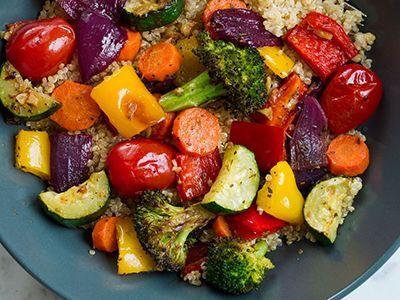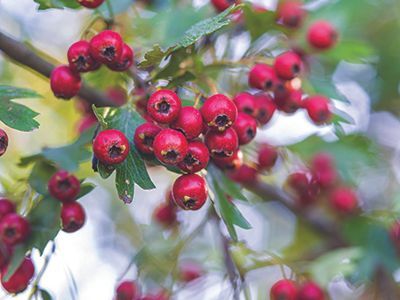Tips to Cultivate Optimum Men’s Health
authored by Taylor Appel, Registered Herbalist (AHG)

Take a moment and think of the most special man in your life - your spouse, dad, grandfather, brother, or perhaps a close friend or co-worker. Like all men, these special individuals embody the masculine force, which is imperative to the gift of life and one side of the coin of creation. Masculine energy brings balance to our dualistic world, so maintaining and further cultivating health is essential for this stability to exist.
Unfortunately, men are met with seemingly unfair statistics placed upon them for merely being male-bodied. This includes the fact that men tend to die younger than women, have higher prevalence of chronic diseases at a younger age, an increased chance for gout, kidney disease, cancers, heart diseases, and more.1 With these grim probabilities, we want ensure that the men in our lives have an abundance of tools to optimize their health. In recognition of National Men’s Health month this June, we are providing insight into simple ways to deeply rejuvenate and nourish men’s health.
Creating a Routine
Cultivating health as we move through our modern-day world can be a challenging feat for anyone, but by creating space for simple, supportive activities and intentions, we can begin to support our innate ability to live and feel healthier. The first step toward ideal health is to create a routine so that you have time to implement any of the actionable items suggested below. After you identify a few activities that feel most aligned with your health goals, the key is to consistently practice them each day -- sticking with one activity consistently is much better than trying to tackle this whole list of suggestions at once. Be realistic, but don’t be afraid to try something new and inspire others to join you on this healthful journey!

Unique Evolutionary Needs of Men
That being said, genuine vitality stems from a multitude of sources. Unfortunately, there is no quick fix solution to achieving optimal men’s health, but by focusing on the evolutionary needs of the masculine form, we can make much more targeted therapeutic suggestions. So, what do I mean by “evolutionary needs”? According to Harvard University, we now have research that emphasizes substantial biological factors that differentiate our genders when it comes to overall health needs, giving us more understanding to better support the male physique.1
These include characteristics such as hormonal makeup (both testosterone and estrogen play a significant role in regulating inflammation and many other processes in the body), reproductive organs (prostate gland), metabolism (keeping the waste under 40 inches is ideal), and work-related stress. Although women certainly experience their fair share of stressors, men take the cake when it comes to compounded risk for both acute and chronic diseases, emphasizing a true need for healthful interventions.1
Each day is an opportunity to choose even just one health-promoting activity -- whether that is being mindful of stress levels, and utilizing tools such as meditation and gratitude practices, or choosing to exercise a little bit each day to promote a healthy metabolism. Each small step helps to promote a healthier male body.

Tips to Cultivate Optimum Men’s Health
TIP #1: Exercise Regularly
Aim for at least a half hour, daily, with ideally both aerobic and weightlifting exercises. Here are a few suggestions for exercises that can be done regularly for maximum benefit:
- Kegels: These contractions of the pelvic floor help to strengthen muscles, reduce urination urgency, and support overall prostate health.
- Walking: Studies show a positive correlation between those who regularly walk and the prevalence of cancer. Try taking short, brisk walks after meals -- this will also help regulate blood-sugar levels.2
- Interval training: Higher intensity training is important for maintaining and gaining muscle mass, weight management, and optimizing hormonal balance in the body; short bursts of different exercises are ideal for supporting the metabolism in burning fat more effectively, over shorter periods of time.2

TIP #2: Eat a Balanced Diet
Aim for organic, whole-foods, rich in antioxidants, and a variety of choices each day -- eating the rainbow is not just for kids!
- Protein: Focus on high-quality protein sources such as grass-fed and finished meats, pasture raised eggs, raw dairy and butter, tallow (especially when cooking -- never heat olive, canola, peanut, or soy oil as they will oxidize when exposed to heat), and fermented dairy, such as kefir and yogurt.
Try eating protein-rich foods first during meals to optimize blood-sugar regulation and lessen the effects of carbohydrates on blood glucose levels.3 Every body requires a unique amount of protein, so focus more on the source of your food and how you feel while eating it, rather than a general macronutrient guideline.
- Focus on Organic: The unfortunate truth about our food supply is that most of the conventional foods we label as “healthy” are sprayed with pesticides, use antibiotic treatments that alter our bodies immune system function and increase the rate of disease. Additionally, most conventional farms are depleting our soils mineral content at alarming rates (resulting in nutrient deficient crops).4 Try your best to source foods from local farmers, organic markets, or choose products labeled organic, pesticide, antibiotic, and hormone free when shopping.

TIP #3: Use Botanical Support
From libido and fertility, to heart and nervous system health, herbs can be a game-changer for men’s health.
- Asian Ginseng: This adaptogenic powerhouse has been known as an invigorating, anti-aging botanical remedy dating back thousands of years. In Traditional Chinese Medicine it was used daily by those that wished to increase mental fortitude, physical stamina, and mitigate stress (nourishing for the adrenal glands). Modern medicine validates these claims and has utilized this herb specifically to enhance libido and fertility in males.5
- Hawthorn: Known as the cardioprotective herb of choice by many herbalists, Hawthorn delivers heart-driven support through its antioxidant-rich fruits and abundance of polyphenols; the flavonoids help relax and dilate arteries, optimizing blood flow, and improving the integrity of the blood vessels. Hawthorn berries also support varicose veins, improve circulation, and provide a plethora of vitamin C for healthy collagen formation.5
- Nettle: Bright green and packed with vitamins, minerals, and electrolytes, this common weed makes a great spinach alternative and can be even used to make pesto. In modern herbalism, this plant is used to promote optimal kidney health, relieve edema, arthritic complaints, gout, congestive heart disease, and help reduce BPH (benign prostatic hyperplasia) levels induced by testosterone. It also increases urination and supports ideal prostate function.5

Bonus Tips for Men’s Health
- Get plenty of sunshine each day. Vitamin D absorbs best through the skin, and watching sunrise and sunset each day can have added circadian rhythm benefits -- goodbye insomnia!
- Stress equals mess – my motto for life. Set boundaries so you don't become overwhelmed and articulate your needs to avoid stressful situations.
- Movement is key! Stagnant energy creates blocks both physically and energetically, so make sure you are making an effort each day to move your body. Even just ten minutes a day will make a huge difference in your mental and physical health.
- Enjoy life more. Take the time to read that book, eat at the fancy restaurant, and call that friend you’ve been meaning to for years. Life is a fleeting gift, so make the most of your days and bask in the glory of being alive!
Join the Mederi Center community by signing up for our email list! We send several emails a month with product promotions for patients, practical tips for healthy living, blogs written by our practitioners, information about events, and other news. You can unsubscribe at any time.
Learn more about becoming a patient >>
References
- Mars vs. Venus: The gender gap in health - Harvard health publishing. Harvard Health. Published August 26, 2019. Accessed May 18, 2022. https://www.health.harvard.edu/newsletter_article/mars-vs-venus-the-gender-gap-in-health
- 5 exercise tips for a healthy prostate. Busch Center. Accessed May 18, 2022. https://buschcenter.com/5-exercise-tips-for-a-healthy-prostate/
- Paterson M, Bell KJ, O'Connell SM, Smart CE, Shafat A, King B. The Role of Dietary Protein and Fat in Glycaemic Control in Type 1 Diabetes: Implications for Intensive Diabetes Management. Curr Diab Rep. 2015;15(9):61. doi:10.1007/s11892-015-0630-5
- Mie A, Andersen HR, Gunnarsson S, et al. Human health implications of organic food and organic agriculture: a comprehensive review. Environ Health. 2017;16(1):111. Published 2017 Oct 27. doi:10.1186/s12940-017-0315-4
- Marciano M, Vizniak N, 2nd ed. Botanical Medicine. Professional Health Systems; 2019: 328-29.


